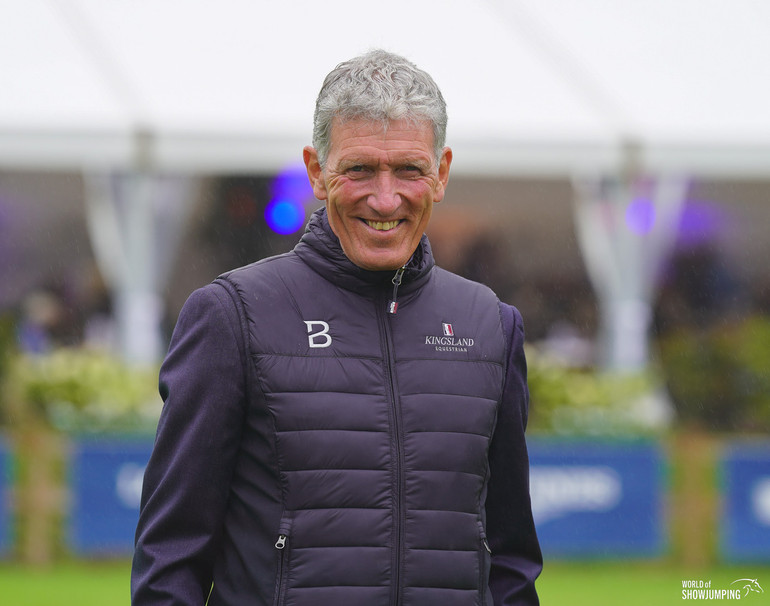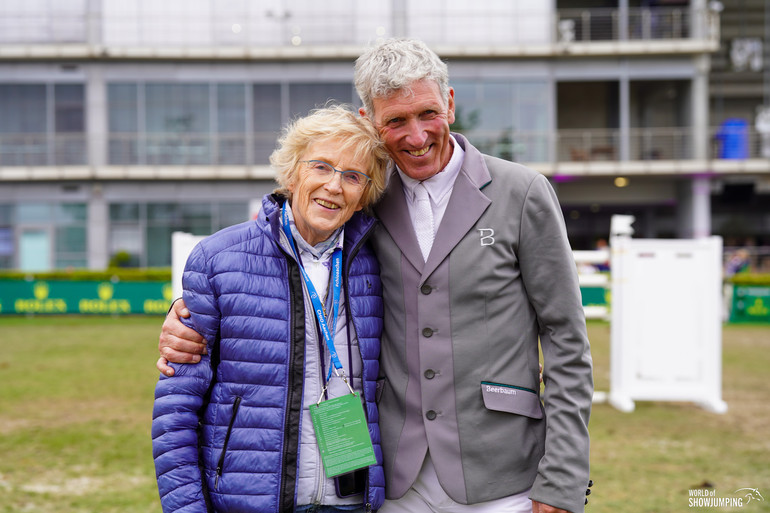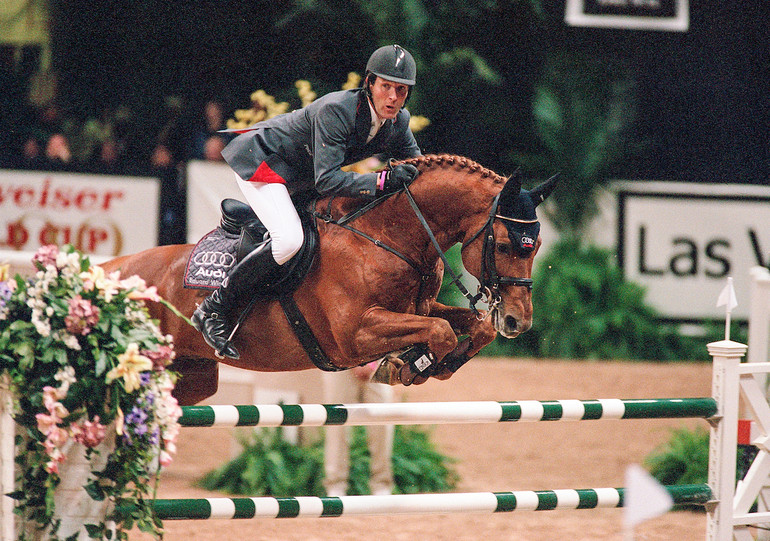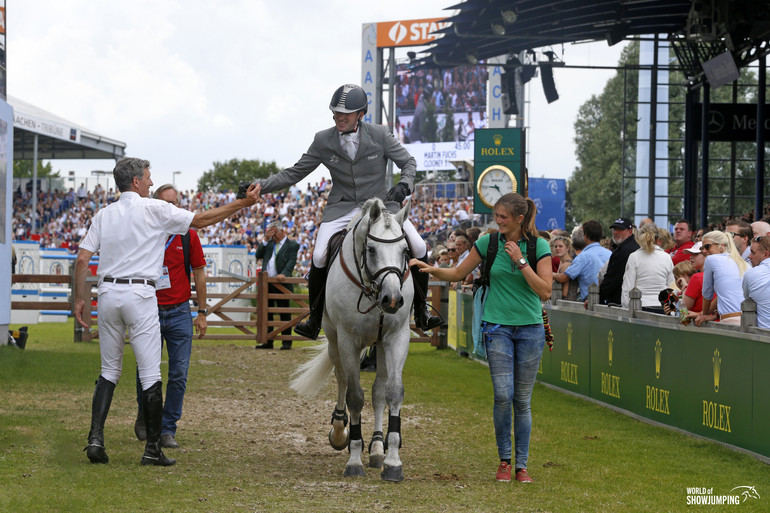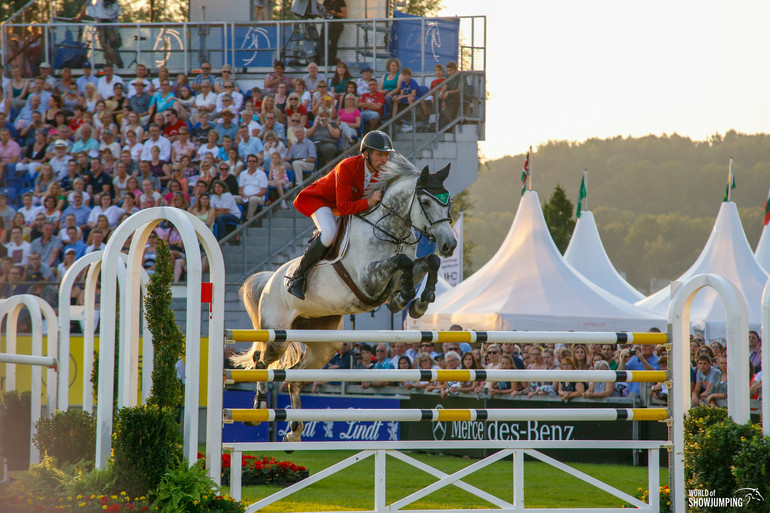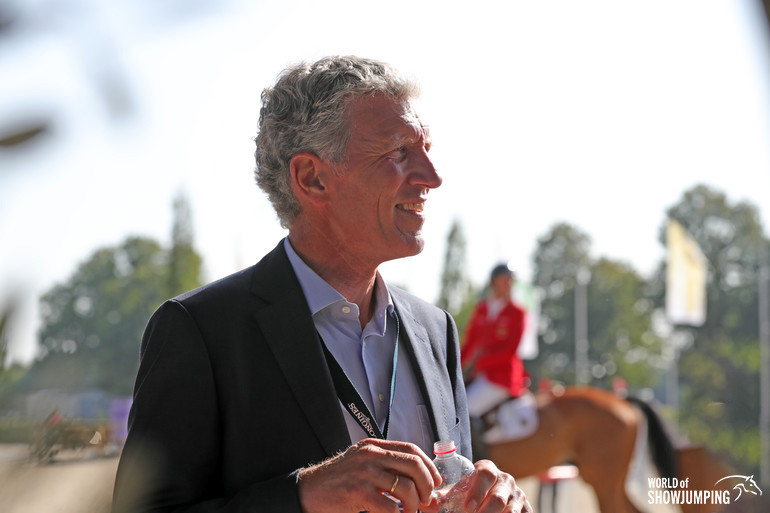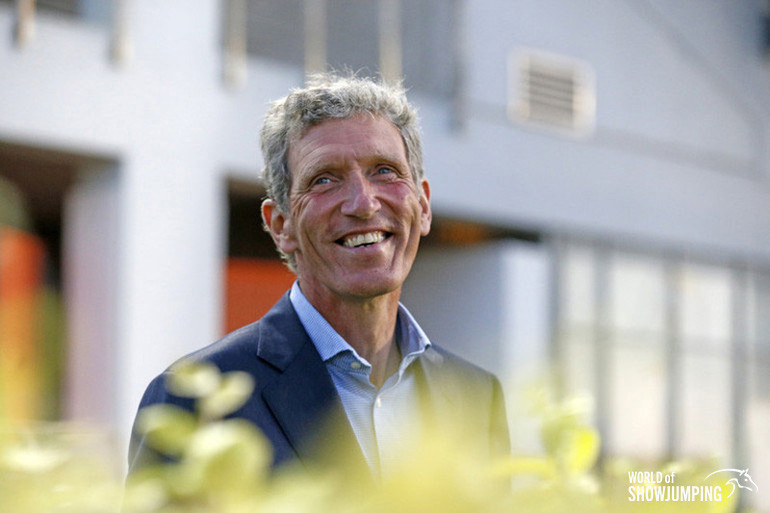Text © World of Showjumping
“How I feel about retirement? That is something I keep asking myself,” Ludger Beerbaum smiles as he sits down with World of Showjumping to talk about the end of his sportive career – which he spontaneously announced at CHIO Aachen at the beginning of July. “I think it is too early to really say how it feels. So far, my daily routine has not changed at all. The strange thing is that it does feel right – I have not had one day where I thought ‘oh, that was a stupid thing to do’. However, until now, I have not been in a situation where the boys have left for a show – leaving me home alone. I am afraid that when that happens, I might feel an itch to go with them.”
Patience and perseverance
The German, who turns sixty in August, can look back at an illustrious career. The majority will probably remember Beerbaum’s many great sporting achievements and ability to excel at the most important occasions, but during his career there have also been doubts, disappointments and setbacks. However, leaving the ring at Aachener Soers to a standing ovation from 40,000 spectators after announcing his retirement, it feels safe to say that Beerbaum has managed to navigate his way through the difficult times. Within the showjumping community, his peers have never wavered in their respect towards him.
“It is not an easy question to answer,” Beerbaum says when asked how he feels looking back at it all. “I am sure everyone has a different view, but when I look back, what is maybe the most meaningful for me is not everything that went well, but what went wrong. Of course, I have enjoyed winning and being successful, but what really makes the difference is when you hit a low and have to get re-organized. If I look back now, this kind of patience and perseverance has been very important. In my case, I have probably learned more from the challenging situations than I ever did from winning – even though winning was much more fun.”
When I look back, what is maybe the most meaningful for me is not everything that went well, but what went wrong
“Looking back at the last 30 years, it would not have been possible without Madeleine,” Beerbaum says about Madeleine Winter-Schulze, who has supported him since 1994. “She has been a key factor in my career, and she feels like a part of my family. Thanks to her, we have been able to keep many of the horses I have ridden and she has given me enough financial comfort to also keep a few horses for my riders. With her support, I have felt safer and it has without a doubt made a difference in the atmosphere of the whole company.”
“For a young rider starting today, without someone like her to support them, it is hard,” Beerbaum reflects on the realities of the sport. “However, it was hard already when I was young and until I was twenty, I had to ride whatever I could get. I think that today, if you are committed enough, there is always a way. Of course, you need a bit of talent and skills as well, but the industry is so much bigger now than it was 30 years ago; there is always room for up-and-coming, talented, committed riders. In many cases, you most likely have to put in some extra hours though. People keep talking about how difficult and expensive it all is, and yes, that is true, but I still believe that it does not exclude anyone. It was like this already when I was young; if you came from a family with a wealthy background, it was easier to get better horses – it has not changed so much.”
You can’t pick favourites
“Speaking about the horses I have had feels like asking a father who his favourite child is,” Beerbaum says when asked about the many amazing horses he was lucky to meet during his career. “The first horse I had as a junior, a chestnut mare called Wetteifernde, was maybe the one that meant the most to me. I did everything with her; we travelled together and I slept in her box at the shows. When we did not have a box at the show – because sometimes those boxes were really expensive – I slept in the trailer next to her. I did my first junior championship in Waldorf near Frankfurt, and for the whole week, I stayed in the trailer with her. A box in the stable cost too much, and she was coughing a bit as well so the air was better for her in the trailer as we could leave everything open. We came third at the Europeans when I was a young rider, and without her, I think I would not be riding today.”
I probably felt the closest connection to Goldfever and he is still at the yard today
Later on, another chestnut found his way into Beerbaum’s heart. “A horse that was the biggest challenge for me in many ways – he was really wild, but then really grew into my heart – was Goldfever. It was really not love at first sight though! However, I would say I probably felt the closest connection to Goldfever and he is still at the yard today. I feel responsible for him, and I try to make his life as nice as possible. He is turning 33, so he is old now and spends all day long outside in the paddock. It feels right having him at home.”
“With Ratina, there was a different type of pressure because she had already been so successful with Piet Raijmakers before me,” Beerbaum continues. “And Classic Touch, who I only had for a year and a half, was an outstanding horse as well, but Gladdys, Champion du Lys, Figaro’s Boy… they were also all great in their own ways.”
It is a give and take
During his career, Beerbaum has always surrounded himself with a group of other riders. Marco Kutscher, Henrik von Eckermann and Richard Vogel have all worked in Riesenbeck, while Christian Kukuk, Philipp Weishaupt and Eoin McMahon still do. “I would not say that I have helped so many others,” Beerbaum says, quick to disagree when pointed towards the fact that he has mentored some of the most successful riders in the world and played a crucial part in the careers of those around him. “Everyone that has worked with me has also helped me,” he says humbly. “It has always been 50/50, it is a give and take, like it should be in any relationship. Marco, Henrik, Philipp, everyone… I have benefitted from having all of them around me.”
I think it is important that people can rely on you and your word
“We have pushed each other, we have fought and gotten on each other’s nerves at times, but we have been there for each other,” he continues. “Maybe I have had more experience in some cases, and have therefore been able to give them some advice, but most of them actually ride better than me, I think! Most of all, I hope they can count on me. It is about giving and taking, and in many ways their success has been good for me as well. When it comes to those around me, I have always tried to be fair. No matter what you do, I believe you should try to have credibility. What I learned already very young, is that you cannot preach water and drink wine; you have to stick to what you say and do as you preach. I think it is important that people can rely on you and your word.”
Like a good dance
Beerbaum’s approach to his riders has never been a traditional trainer-rider-relationship, but rather one of constant support and presence in the daily work. ‘You have to know what you are doing and why’, and ‘there has to be music in your riding’, are phrases that have been heard from Beerbaum as advice to his team members. “Riding is about connection,” he explains. “Riding should be like a good conversation, where you have the feeling that the one you are having it with is really present, really there, and listening to you. When we communicate with our horses, there has to be the right vibe, the right feeling and engagement from both sides. In the end, when you watch the riders that are performing the best on the highest level, they are really connected with their horses. At its best, riding is like a good dance.”
You have to know what you are doing; and the knowing comes first, and never really ends
“You have to know what you are doing,” Beerbaum continues. “And the knowing comes first, and never really ends. From the first day with a new horse, you need to get to know the horse and its character – not just start working blindly. Sometimes it is better to walk a bit longer, really get their attention, see how they feel, are they tense or relaxed… And this is also about learning by doing, with each and every horse, every single day. Every time I get a new horse, it for sure takes weeks until I have some kind of an idea about the best way to ride and train that individual. And even after showing for months and years, you still adjust; it is never perfect, there are little things that can be improved all the time. These little things, especially with a sensitive horse, can make a huge difference. I think you have to keep this in mind all the time; every single jump, every trot pole, every exercise, you have to do what makes sense for that particular horse in that particular moment.”
Riesenbeck International
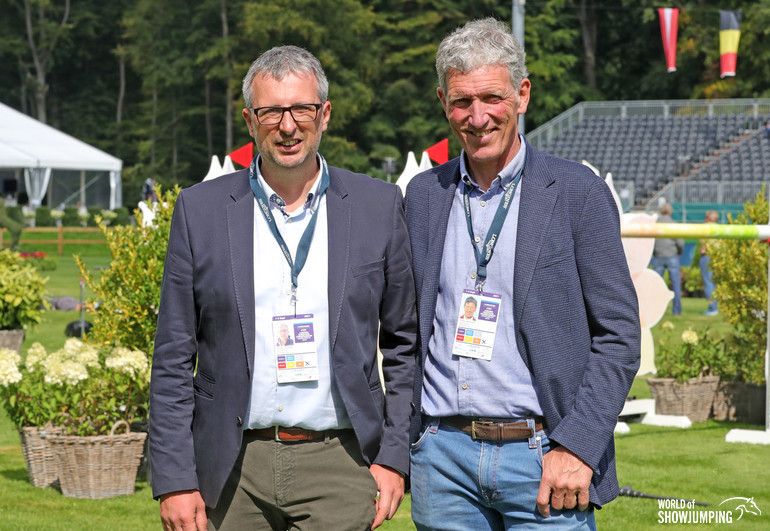 "Riesenbeck International is more about Karsten Lütteken and his team – they really run everything on their own, even though I am put in the forefront," Beerbaum says, here with Karsten Lütteken at the Longines FEI Jumping European Championships 2021 at Riesenbeck International. Photo © Jenny Abrahamsson for World of Showjumping.
"Riesenbeck International is more about Karsten Lütteken and his team – they really run everything on their own, even though I am put in the forefront," Beerbaum says, here with Karsten Lütteken at the Longines FEI Jumping European Championships 2021 at Riesenbeck International. Photo © Jenny Abrahamsson for World of Showjumping.
At the end of July, Jan Tops’ Longines Global Champions Tour made a stop at Riesenbeck International – the show venue built by Beerbaum and that in 2021 hosted the FEI Jumping European Championships. “There was never a big masterplan,” Beerbaum tells about the story behind the venue which is located five minutes from his home stables. “It all grew organically; one thing simply led to another. When we first moved to Riesenbeck in 1994, I never thought that it would be like this one day. Back then, we had Uncle Hans’ house and an old chicken stable next to it. Then we started to build the indoor, and after ten years, we built outdoor boxes next to Uncle Hans’ old house – which is where Henrik was with his horses when he first started to work for me. As the company grew, we rented stables from the neighbour, and then Philipp’s stable was built in 2012. At first, we had one outdoor sand arena above the indoor, and a grass ring with a racetrack around it and then we built another sand arena in front of the yard.”
There was never a big masterplan
“It has all grown step by step, and at one point we realized that in the winter we were way too many riders and horses in the indoor. My initial plan was to build another indoor next to the stables, but then Baron Heereman came and told me that I should build on his land instead – where Riesenbeck International is now. That is how it all started. Today, in reality, Riesenbeck International is more about Karsten Lütteken and his team – they really run everything on their own, even though I am put in the forefront. I think we are a good team, but I am more in a supportive role. Everyone seems to think I am doing all the work, but I am really not – I am only the ambassador and standing still most of the time,” Beerbaum smiles.
“We want to establish Riesenbeck International as a nice venue to run shows – not necessarily only high-end five-star shows – but day shows for young riders, amateurs and young horses,” he says about the future plans for the venue. “A few times a year we can do a top event. This is our plan for the coming five years – and of course we always aim to improve.”
It cannot be all talk, no action
Knowing that there are challenges, Beerbaum is optimistic when it comes to the future of the sport. “We have to explain why and how we do what we do. If we do this right, and not just talk about it, not just create nice pictures and print how the welfare of the horse comes first in every program, but really act on it, if we manage to do that as a community, then I think we have a good future. Working with horses, and I don’t mean only being a professional or competing, but just simply being around horses for fun, can be so beneficial. Horses have so much to give to the society, especially in the digital world we live in today. I think it is a pretty good option being with a horse, with an animal, instead of being online all the time. I am not saying that everything is super and it is all going to be easy – not at all. However, I do believe that if we live as we preach, the future is bright.”
We have to explain why and how we do what we do
“In general, I would regret if we lost it, but I think we have to manage it a lot better,” Beerbaum says when asked how he feels about the future of the FEI Nations Cup-series – now called the League of Nations – and the changes planned for the traditional format. “The way it is done now, with the battle between the sponsors and the fact that we are losing out on many of the traditional venues… I think we can do better. I am curious to see which three European venues the FEI will select for their new League, and I hope they find good ones. We have to make sure that the Nations Cup-series survives. It is in many ways the backbone of our sport and something that is needed in order to get ready for the major championships as well. To have this team spirit with your fellow countrymen is unique.”
It would be ideal if everyone worked closer together for the right goals
“It would be ideal if everyone worked closer together for the right goals, even though I understand that it is difficult,” Beerbaum continues. “With this I don’t only mean the riders and the FEI, but also all the national federations, the EEF and the show organizers. Bottomline, everyone is looking out for their own interests at the moment, and many times it is the economic questions that come up first and lead the way. If we look outside of our industry and our sport, we can see quite a similar situation in many other sports; people just looking for their own advantage. Why is it, and is it easy to change? I don’t know. There is a lot of money involved in our industry, but for sure we have to keep in mind that in the end, we are all in this together, and the common goal should be the best for our sport and our horses. And, in parallel, we should not forget about the climate issues and what that discussion means for our sport either.”
Staying productive
Even though Beerbaum has announced his retirement, truly slowing down seems like an unrealistic option for the German who is known for his active lifestyle, hard work and down to earth attitude. There has never been a success so big that he would have chosen not to work the day after. “No matter how much you win or how well it goes, it is important to get back to work,” he says. “You have to stay humble and keep your feet on the ground. If you let success get to you, you will move backwards. For me, I always felt I had to be physically active, because I could be a bit moody, and I am a bit tall. I am not the perfect size to be a rider, so I have to make sure I stay fit. In general, I feel better when I move, and when I was around 40, I started to take exercising seriously. At first, I thought I simply had to do it to stay fit but after a while I noticed I felt much better in general, my mood improved – and that is why I kept on it, and still do.”
No matter how much you win or how well it goes, it is important to get back to work
“I won’t stop riding,” Beerbaum says. “Riding and working with the horses is still the best part of my day. With horses, I don’t need to speak, which I really like, and as long as I have the feeling that I can be a bit productive, I will keep riding. I can ride the young horses, even take them to a national show somewhere, and when the boys are going from show to show, I can ride the delicate ones at home, make sure they are fit and developing in the right way. Riding is fun, and I still have the feeling that this is the part where I am most productive – way more than in show organizing,” he smiles.
2.8.2023 No reproduction of any of the content in this article will be accepted without a written permission, all rights reserved © World of Showjumping.com. If copyright violations occur, a penalty fee will apply.



